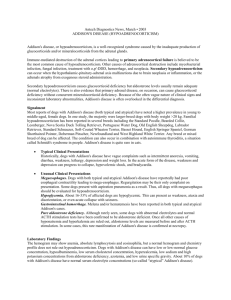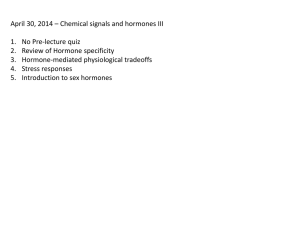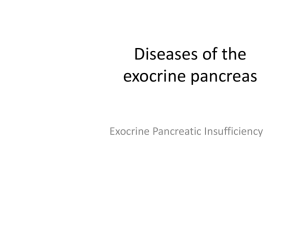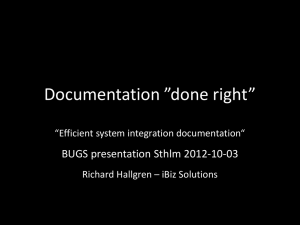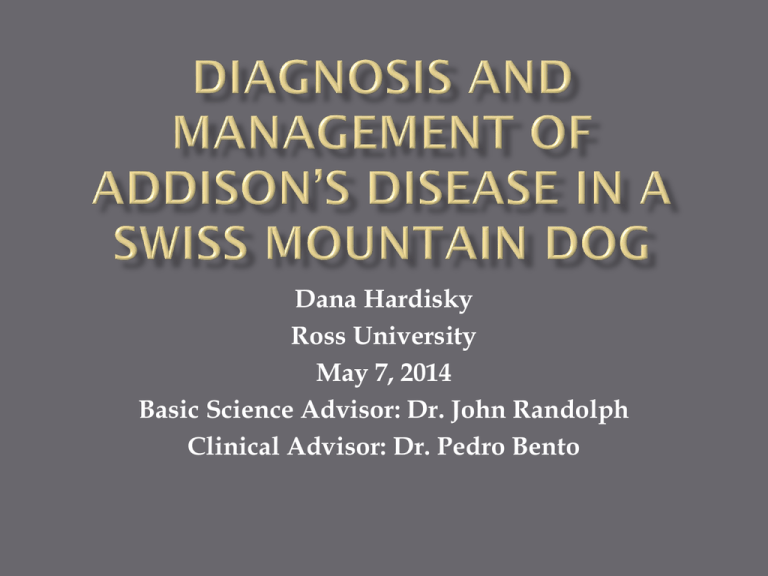
Dana Hardisky
Ross University
May 7, 2014
Basic Science Advisor: Dr. John Randolph
Clinical Advisor: Dr. Pedro Bento
o
o
o
6 year old female spayed Swiss Mountain Dog
Mildly overconditioned (BCS 6 / 9)
Remaining physical examination unremarkable
•
December 11, 2012 - CUHA Emergency
•
January 15, 2013 – CUHA CPS
Vomiting, Diarrhea, and Poor Appetite
Poor Appetite and Hematochezia
Baseline T4 consistent with HYPOTHYROIDISM
•
January 31, 2014 – CUHA CPS
Lethargy and Poor Appetite
Complete Blood Count, Serum Biochemistry Profile
Baseline Cortisol Concentration
•
February 07, 2014 – CUHA SAIM
Further evaluation of dog including laboratory
abnormalities
Parameter
Value
Reference Range
38%
41 - 58 %
WBC
12.4 thou/uL
5.7 - 14.2 thou/uL
Seg Neutrophils
7.7 thou/uL
2.7 – 9.4 thou/uL
Lymphocytes
3.1 thou/uL
0.9 – 4.7 thou/uL
Eosinophils
1.2 thou/uL
0.1 – 2.1 thou/uL
Platelet Count
281 thou/uL
186 – 545 thou/uL
Hematocrit
Parameter
Value
Reference Range
Sodium
146 mEq/L
142 – 150 mEq/L
Potassium
6.1 mEq/L
3.8 – 5.4 mEq/L
Chloride
110 mEq/L
105 – 116 mEq/L
BUN
30 mg/dL
10 – 32 mg/dL
Creatinine
1.6 mg/dL
0.6 – 1.4 mg/dL
Calcium
10.7 mg/dL
9.3 – 11.4 mg/dL
99 mg/dL
138 – 332 mg/dL
Cholesterol
Sodium Potassium Ratio = 24:1
Baseline Cortisol < 0.2 ug/dL (ref: 1.8 - 4 ug/dL)
Hyperkalemia
DDx: Gastrointestinal disease, Renal disease, Urinary
obstruction, Acidosis, Hypoadrenocorticism
Hypocholesterolemia
DDx: Gastrointestinal disease, Hypoadrenocorticism,
Liver disease
Waxing and Waning Gastrointestinal Signs
DDx: Dietary indiscretion, Gastrointestinal Disease,
Pancreatitis, Liver disease, Hypoadrenocorticism
Lethargy
DDx: Endless …….
Low Baseline Cortisol
DDx: Hypoadrenocorticism, Normal variation
Hyperkalemia
DDx: Gastrointestinal disease, Renal disease, Urinary
obstruction, Acidosis, Hypoadrenocorticism
Hypocholesterolemia
DDx: Gastrointestinal disease, Hypoadrenocorticism,
Liver disease
Waxing and Waning Gastrointestinal Signs
DDx: Dietary indiscretion, Gastrointestinal Disease,
Pancreatitis, Liver disease, Hypoadrenocorticism
Lethargy
DDx: Endless …….
Low Baseline Cortisol
DDx: Hypoadrenocorticism, Normal variation
Electrolyte Panel
Hyperkalemia 5.6 mEq/L (ref: 3.8 – 5.4 mEq/L)
ACTH Stimulation Test
Cortisol pre–ACTH < 0.2 ug/dL (ref: 1.8 – 4 ug/dL)
Cortisol post–ACTH < 0.2 ug/dL (ref: 6 – 16 ug/dL)
Endogenous ACTH Concentration
ACTH 322 pg/mL (ref: 0 – 25 pg/mL)
Definitive Diagnosis: Addison’s Disease
Definitive Diagnosis –
ACTH Stimulation Test: subnormal cortisol
concentrations before and after
administration of ACTH
Hyperkalemia, hyponatremia, Na:K< 27:1 or
Subnormal aldosterone concentrations
Increased endogenous ACTH concentration
“The Great Pretender”
Clinical Signs
o
o
Anorexia, Lethargy
Vomiting, Diarrhea
Laboratory Findings
o
o
o
o
o
o
Hyperkalemia, hyponatremia, hypochloremia
Azotemia
Non-regenerative anemia
Reverse stress leukogram
Hypercalcemia
Hypocholesterolemia
85% to 90% of adrenocortical tissue destroyed
Adrenal Cortex consists of:
Zona Glomerulosa – secretes mineralocorticoids
Zona Fasciculata – secretes glucocorticoids
Zona Reticularis – secretes sex hormones
Leads to deficiencies in mineralocorticoids and
glucocorticoids
•
Mineralocorticoids (Aldosterone)
1) Body Water Homeostasis
2) Enhances Sodium Reabsorption
3) Enhances Potassium Secretion
•
Glucocorticoids (Cortisol)
1) Counteracts Stress
2) Maintains Blood Pressure & Water
Balance
3) Gluconeogenesis & Lipolysis
4) Stabilizes Membranes & Endothelium
•Immune-mediated
mechanisms suspected
•Other
Rare Causes
Infiltrative Fungal Disease – Histoplasma,
Blastomyces, Coccidioides,
Cryptococcus
Infections
Neoplasia
Amyloidosis
Trauma
Coagulopathy
•Autoimmune
Polyglandular Syndrome
Up to 5% Addisonian dogs have concurrent
endocrine-deficiency conditions
•
•
Young to Middle Age Females
Breed Predilection
Standard Poodles
o Portuguese Water Dogs
o Nova Scotia Duck Tolling Retriever
o Great Danes
o West Highland White Terriers
o
www.bigskypoodles.com
www.aboutnovascotiaducktollingretriever.blogspot.com
Lifelong Therapy
Mineralocorticoid Replacement Therapy
Desoxycorticosterone pivalate (DOCP)
1-2.2 mg/kg IM or SC every 25 days – adjust dose based
on electrolyte concentrations at 12 & 25 days
OR
Fludrocortisone - starting dose 0.02 mg/kg/day PO (also
contains glucocorticoid)
animalendocrine.blogspot.com
Glucocorticoid Replacement Therapy
Prednisone 0.1-0.2 mg/kg/day PO
Current Therapy Protocol 44.7 kg dog
DOCP (1.1 mg/kg SC every 25 days) = $87.58
Prednisone = $4.35 / month
Total cost = $91. 93 /month
OR
Fludrocortisone (0.02 mg/kg/day ≈ 0.9 mg/day)
0.1 mg tab = $1.19 $10.71 /day or $321.30 /month
Consultations Fees:
$ 286
Diagnostic Testing:
$ 397.84
Medications:
$ 525.94
Grand Total:
$ 1,209.78
Baumstark ME, Sieber-Ruckstuhl NS, Muller M, et al. Evaluation of aldosterone concentrations in dogs
with hypoadrenocorticism. J Vet Intern Med 2014;28:154-159.
DiBartola, SP. “Fluid Therapy in Endocrine and Metabolic Disorders.” In: Fluid, Electrolyte, and Acid –
Base Disorders in Small Animal Practice. St Louis: Elsevier Saunders, 2012; 500- 511.
Feldman, E and Nelson R. “Hypoadrenocorticism.” In: Canine and Feline Endocrinology and
Reproduction. St. Louis: Elsevier Saunders, 2004; 394-438.
Kintzer PP, Peterson ME. Treatment and long-term follow up of 205 dogs with hypoadrenocorticism. J
Vet Intern Med 1997; 11: 43-49.
Klein SC, Peterson ME. Canine hypoadrenocorticism: Part I. Can Vet J 2010;51:63-69.
Klein SC, Peterson ME. Canine hypoadrenocorticism: Part II. Can Vet J 2010;51:179-184.
McGonigle KM, Randolph JF, Center SA, et al. Mineralocorticoid before glucocorticoid deficiency in a
dog with primary hypoadrenocorticism and hypothyroidism. J Am Anim Hosp Assoc 2013;49:54-57.
Mitchell AL, Pearce SH. Autoimmune Addison disease : pathophysiology and genetic complexity. Nat
Rev Endocrinol 2012;8:306-316.
Oberbauer AM, Bell JS, Belanger JM, et al. Genetic evaluation of Addison's disease in the Portuguese
Water dog. BMC Vet Res 2006;2:15-22.
Short AD, Boag A, Catchpole B, et al. A candidate gene analysis of canine hypoadrenocortisciem in 3 dog
breeds. J Hereditary 2013;104: 807-820.
Thank You
Dr. Randolph
Dr. Bento
Friends &
Family



